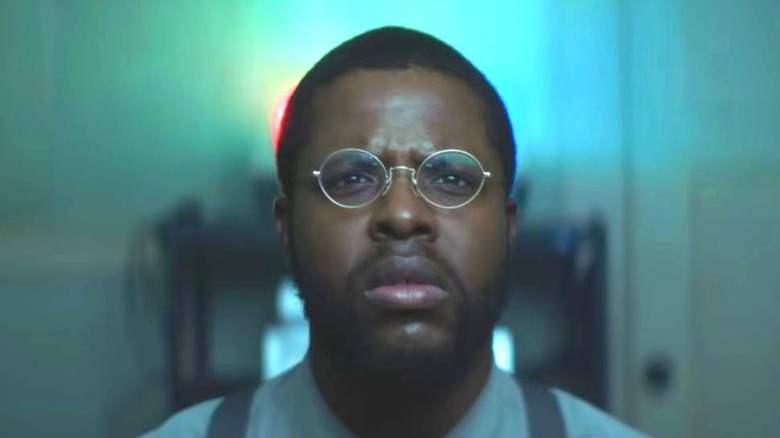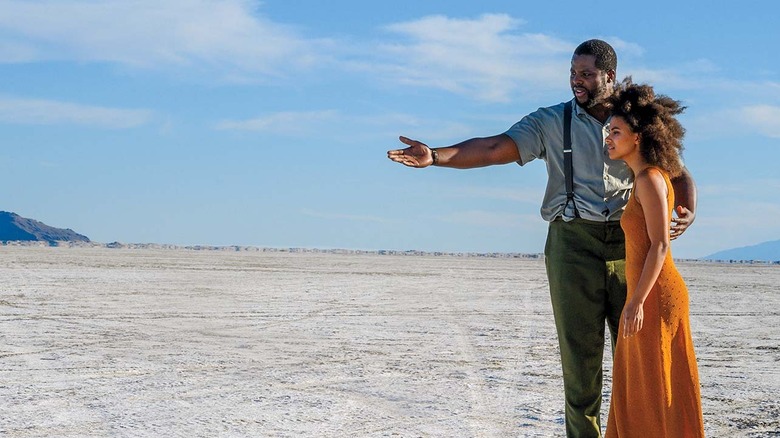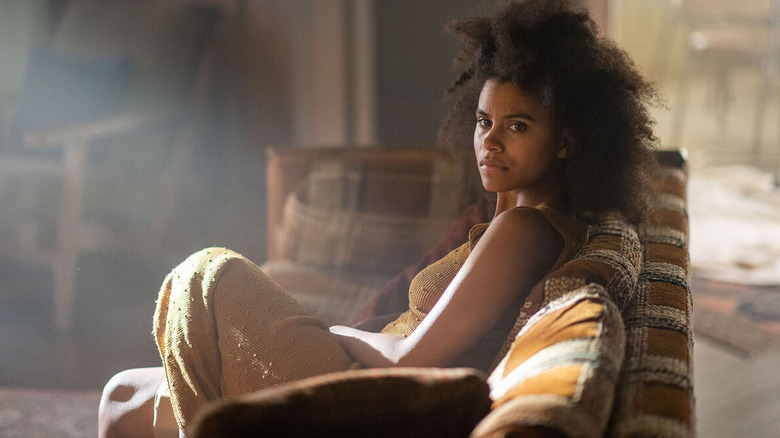Nine Days Review: Science Fiction Gets Spiritual
There are many cases of films not living up to the expectations set by a marketing campaign, but very few manage to set a bar quite as high as the poster for "Nine Days." Instead of the sea of five-star ratings and pull quotes you'd expect from a festival sensation (arriving in theaters nearly 18 months after its Sundance 2020 premiere), there is just a single critical appraisal, telling audiences that the film will "invite you to reconsider your entire worldview." And while no review should focus on what a poster or a trailer promises instead of analyzing the film itself, it's hard to not think that this was exactly the kind of response writer/director Edson Oda was aiming for with his debut.
If there is a single reason why I didn't find "Nine Days" to be anywhere near as profound or moving as most viewers, it would probably be the all-apparent sense that the writer/director was self-consciously trying to make a film that would be received this way. This is a film singularly obsessed with trying to convey its idea of the meaning of life and other weighty existential concepts, its unusual blend of faith-based drama and high-concept science fiction proving oddly calculated to trigger an emotional response. Nothing in the film feels naturally moving, its emotional profundity as artificial as the memories its protagonist creates for the lost souls who won't pass through to the mortal world.
A secret religious drama
In a spiritual realm that's not quite the afterlife, we're introduced to Will (Winston Duke, a standout in "Us" and "Black Panther"), a formerly living soul now tasked with watching over the living — POV accounts of life on Earth that come, inexplicably, through grainy VHS quality footage. The rules for his job are simple: when a person on Earth dies, a new soul must be sent to start life in the human world, with Will responsible for conducting interviews to find the souls who would be able to exist in such a cruel environment. Over the course of nine days, he asks them a series of philosophical questions designed to see how much they can adapt to such a morally slippery environment; these range from in severity from "would you kill your child if an officer in a concentration camp ordered you to?" to "how would you feel if your mom baked cookies for your brother but not you?"
Of the now-living souls whose lives he watches over, Will is most fascinated with the life of violinist Amanda, but her untimely death means he is then tasked with finding a suitable soul to replace her. At the start of the nine-day period, interview prospects include Alexander (Tony Hale), Kane (Bill Skarsgård), and Emma (Zazie Beetz), with the latter soul proving to be of the most fascination, refusing to take part in an intense questionnaire devised of binary choices. Her approach to the process is unlike anything Will has seen before, showing no enthusiasm for the interview, but displaying a boundless curiosity and empathy unusual for a soul still early in formation. As Will grapples with his own mistakes during a life on Earth, and the paths taken by those souls he gave human life to, Emma proves foundational in helping to reshape the way he views life, and his place in the universe.
As this synopsis makes clear, this is a film that painstakingly strives to be considered meaningful, while maintaining an emotional simplicity designed to enrapture viewers enough so that they can overlook the various leaps of logic in its world-building. As with Pixar's recent "Soul," a similarly themed but more satisfying take on the same concept, in "Nine Days" souls have personalities and a sizable awareness of life on Earth mere hours after being created in the pre-life realm. This is the cause of Will's central tension, as he watches over souls he's approved to transfer into human bodies as they have lives differing wildly from the paths he imagined for them — something which changes his approach to the souls he lets pass through his interview stage, with kindlier ones now as likely to be unsuccessful as those which are malevolent. Will is revealed to be somebody who has regrets about his own time on Earth, where he never pursued his passions and now is spending eternity watching others similarly squandering theirs. His internal crisis is framed as a classic existential dilemma, a man who fell out of love with life and took that energy with him to the great beyond.
While not a faith-based drama, the specifications of its afterlife not neatly fitting into any clear religious worldview, "Nine Days" does frequently ring as hollow as one. Like so many films before it (up to and including "Soul," which was in production at the same time as Oda's film), it's a film which aims to resolve a character's wider existential depression via merely reconnecting them to experiencing the small joys of life. Instead of feeling profound or revelatory, it just feels like a high-concept reimagining of the same platitude countless films have given us before — the idea of appreciating time spent with loved ones, or physical sensations like the sand between your toes, as a reason to get up every morning. It's the reason it feels like a faith-based drama despite no direct religious ties, as complex human emotions about loss and our place in the universe are simplified to quaint ideals which can unnaturally cure any uncertainty or wider mental health issue.
Stylish but unoriginal
I was often reminded of the line at the start of "Life of Pi," where the main character's tall tale was billed as being so profound it would make anybody who heard it believe in God — the revelatory twist being that to believe in something seemingly so far-fetched is the same as having faith. Here, faith is replaced by reclaiming a sense of joie d'vivre, and it proves substantially less affecting considering everything from "It's a Wonderful Life" to "Groundhog Day" has already explored this in such a moving fashion in decades gone by. The film doesn't change my cynical worldview so much as it makes me think back to the ones that managed to do so.
"Nine Days" is executive produced by Spike Jonze, with its high concept and emotional earnestness earning several comparisons to the director's earliest collaborations with screenwriter Charlie Kaufman. But it's Kaufman's most lauded work with another filmmaker that seems to be what Edson Oda is striving to evoke, with a visual sensibility that often recalls "Eternal Sunshine of the Spotless Mind" in its highly stylized depictions of memories and the ways in which Will recreates them for unfortunate souls. It may be derivative of a better filmmaker (in this case, Michel Gondry), but the scenes where Will recreates memories are the most effective part of "Nine Days," showing that Oda has what it takes to follow in the footsteps of such a singular visual stylist. Whether he'll be able to find a heart that's as authentic, only time will tell.
Although many have been moved to tears by "Nine Days," I was sadly very much in the minority who were left cold. Feeling like a cynical attempt to be profound rather than being earnestly moving, it became a testing experience that felt as long as the title.


